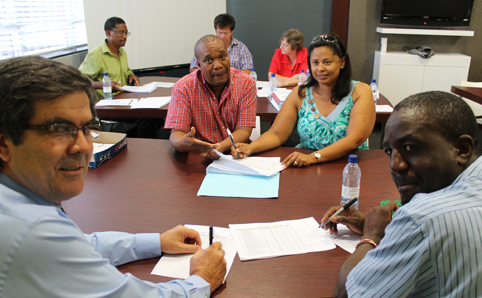 |
| The UFS will award bursaries to about 670 students this year. These bursaries, to the value of over R42 million rand, will give these students the opportunity to follow their dream of becoming educators in South Africa. At the selection process were, from the left: Prof. Gawie du Toit, Programme Director: Initial Teacher Education at the UFS, Dr. Rantsie Kgothule, Teaching Practice Coordinator at the UFS Qwaqwa Campus; Ms Fiona Padayachee, Deputy Director: Recruitment and Selection in the Free State Department of Education; and Mr Kennedy Vilankulu, Information Manager at the Fundza Lushaka bursary scheme. |
This year, 675 students from the University of the Free State’s (UFS) Faculty of Education will be awarded bursaries worth more than R42 million from the Fundza Lushaka bursary scheme.
The selection process for the recipients is already underway. Although each student’s academic performance plays a vital role in the selection process, beneficiaries are also selected based on performance in scarce subjects like mathematics, science and African languages.
“We are trying to attract and train as many teachers as possible. Hoping they will honour their contract and teach in South Africa” said Mr Kennedy Vilankulu, Information Manager at the Fundza Lushaka Bursary Scheme.
Mr Vilankulu commended the faculty on its management of the bursary scheme. This is evident in the close liaison between the faculty, on both the Bloemfontein and Qwaqwa campuses, and the Free State Department of Education. Just over 90% of the beneficiaries of the bursary scheme study at the UFS.
Prof. Gawie du Toit, Programme Director: Initial Teacher Education (ITE) says the quality of a school can never exceed the quality of its teachers. It is the faculty’s aim to educate caring, accountable and critically reflective education practitioners. These teachers must be able to act as agents of change in diverse educational contexts. Prof. Du Toit said it was a privilege to collaborate with both national and provincial Departments of Education in this venture.